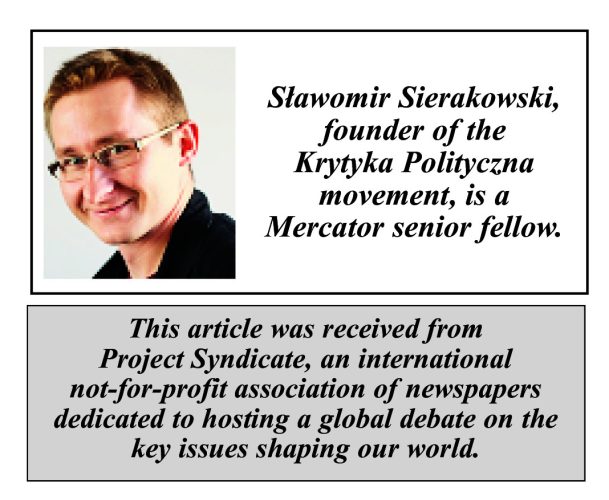WARSAW – When Angela Merkel left the German chancellorship in December 2021, after 16 years in power, she had a credible claim to being one of the greatest politicians of the twenty-first century (so far). Now, after three years of deafening silence, and with her legacy in shambles, she is promoting her political memoir. Her silence was more persuasive.
She gave her first interview to the German weekly Der Spiegel, defending major policies that helped to shape Germany and Europe as we know them today. Among these were her appeasement of Russia, which adhered to the Cold War principle of “change through trade” (Wandel durch Handel); her welcoming of more than one million refugees (mostly from Syria and the Middle East) in 2015; and the phaseout of Germany’s nuclear power plants.
A fourth issue concerns not a policy but the lack of one. Owing to Merkel’s failure to do anything noticeable to adapt the German economy to this century’s technological challenges, the country remains under-digitalized, with embarrassingly poor internet access, an absurdly overgrown bureaucracy, governing institutions that still use fax machines, and once-dominant companies that can no longer compete with their American and Asian counterparts. German highways and bridges are crumbling, trains regularly run late, and major infrastructure projects (like Berlin’s rail station and airport) take two or three times longer than they would in Poland or even Romania.
Where once Germans heaped scorn on Poles for supposedly being foolish and incompetent, now the tables have turned. Visit Germany nowadays and you may find that you cannot even pay for breakfast with your credit card. You will have to run to an ATM, but you may find that it is broken or does not accept Visa or Mastercard (as is the case two-thirds of the time). And don’t even think about connecting to Wifi. You will find better access (and a more dynamic information-technology sector) in Belarus – a Russian vassal state.
Moreover, Merkel did nothing during her 16 years in power to prod the industries that Germany prides itself on – chemicals, pharmaceuticals, internal-combustion vehicles – to adapt to the twenty-first century, and now it shows. The German army, meanwhile, is regularly an object of ridicule in the European press.
If Germans prefer to use fax machines and avoid the internet, that is their business. Unfortunately, though, their government’s decisions affect all of Europe. Merkel’s moral argument for providing aid and shelter to refugees in 2015 is uncontroversial. But surely she should have known that immigration on such a massive scale would produce a populist backlash, not only in Germany but throughout Europe. Merkel made a show of standing up for liberal democratic values, but her policy yielded an assault on them. The result was weaker liberal democracy and less immigration.
Similarly, by stubbornly insisting on the Nord Stream and Nord Stream II pipeline projects, Merkel and other German leaders empowered a dangerous dictator who had revisionist designs on Eastern Europe. And by blocking NATO from offering a “membership action plan” to Ukraine and Georgia at the 2008 Bucharest summit, Germany effectively invited Russia to invade. Anyone with an elementary knowledge of Russia’s foreign policy knew that the Kremlin would exploit the resulting uncertainty.
In her Spiegel interview, Merkel blames others for this litany of failures. She says she was not the only one against a NATO accession process for Ukraine and Georgia; but is that supposed to excuse her? Europeans took their cues from Germany in those days, and Merkel’s voice mattered more than others – as she well knows.
Similarly, Merkel is still repeating the canard that Nord Stream was a purely economic project, even though it obviously was not. In defending appeasement of Russia, she argues that Poland and Ukraine did not mind having gas transit through their territories as long as they profited from it. But the controversy around Nord Stream was that by circumventing Poland and Ukraine, it diminished whatever influence they had vis-à-vis Moscow. Merkel decided that cheaper gas was more important than Polish or Ukrainian security. In the end, her approach brought an energy crisis and was one of the causes of a new land war on the European continent. The result was no cheap energy and no security.
Merkel’s decision, following the 2011 Fukushima disaster in Japan, to phase out Germany’s nuclear power plants also empowered Russia by making the German economy even more dependent on Russian hydrocarbons. Again, such choices could still be defensible if we lived in blissful ignorance of Vladimir Putin’s true character. But after 2008, and especially after 2014, there was no longer any question about who he was and what he intended to do.
Merkel herself was repeatedly warned. As early as 2006, Radek Sikorski, then Poland’s defense minister, was comparing the Nord Stream project to the Molotov-Ribbentrop Pact (the secret 1939 agreement between Hitler and Stalin not to attack each other). Five years later, he was still beating the same drum, warning that Poland and Europe had more to fear from German passivity than from German power.
Merkel ignored these arguments. During her long tenure, Germany tried to trade Eastern European security for cheap energy, abandoned an existing renewable-energy source, and gave nativist populists a potent campaign issue. She made Europe less safe from threats both foreign and domestic. Today, with Germany mired in a leadership crisis and buffeted by new global headwinds, Merkel continues to tell herself that she did everything right.
Copyright: Project Syndicate, 2024.
www.project-syndicate.org










